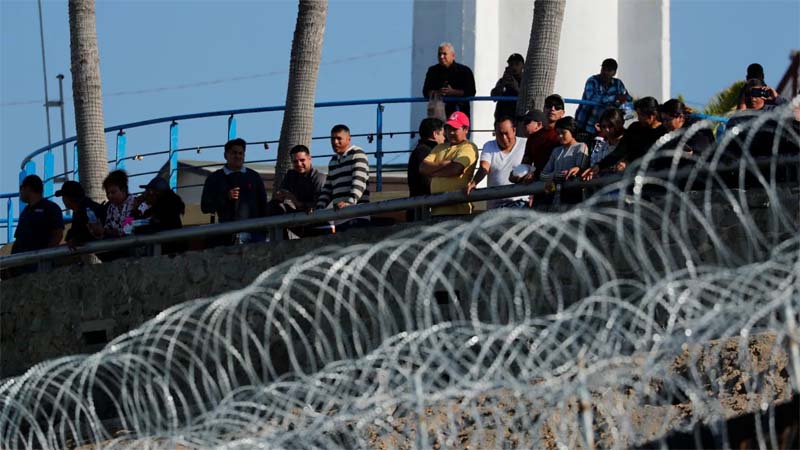
I last wrote about Biden’s deportation policy. On the other side of deportation is immigration parole. Immigration parole allows someone who is inadmissible or does not have a legal basis to come into the United States to be allowed to enter for either a humanitarian reason or a significant public benefit.
For people coming to a port of entry, parole is usually granted by the Customs and Border Patrol (CBP). These people are then referred to see Immigration and Customs Enforcement (ICE), Enforcement and Removal Operations (ERO), commonly referred to as the deportation officers. From there, they are usually given a Notice to Appear (NTA) and told they will be scheduled for a hearing with the Immigration Judge.
In this process, where the immigration parole is granted by the border patrol at the port of entry, the person has avoid being put in detention. This type of immigration parole does not happen often. Based on my experience, it has happened with pregnant women, or families coming to the border with minor children.
More often, if a person comes to the border and tells the CBP they have a fear of returning to their home country, they will be referred to the deportation officers, placed in detention, and will be in removal proceedings. While in detention, they will be scheduled for a credible fear interview with an asylum officer. If they pass the credible fear interview, they are eligible to ask for parole from the deportation officer.
Under Obama’s 2009 Parole Directive detained asylum seekers who passed a credible fear interview with an asylum officer should be granted parole if they can establish their identity and demonstrate that they are not a flight risk or a threat to security. Generally, this involved an attorney working with the person’s deportation officer.
At this point, the deportation officer and his or her supervisor have discretion to either grant or deny parole. The key word here is “discretion.” It means they can grant or deny the immigration parole request based on whether the asylum seeker has a fear of returning to his or her home country, whether there is any criminal history or history of immigration violations, the strength of a person’s family ties in the United States, and the person’s character. These factors are considered on a case-by-case basis, meaning each case is unique and is treated individually.
It is the immigration lawyer’s job to establish that the asylum seeker meets all the favorable factors to warrant a favorable grant of parole. The immigration lawyer will do this by submitting documents such as a sponsorship letter from a family member with legal status, and other supporting documents that prove the sponsor’s address, legal status and financial ability to provide a home and other basic necessities for the asylum seeker.
However, those were the good ol’ days when the asylum system functioned this way. And even then this is not the way things functioned in Arizona. Most of the time, the deportation officers and their supervisor will decline to exercise their discretion to grant immigration parole. The most common reason is that the asylum seeker is a “flight risk.”
Most people who come to the border fleeing persecution in their home country come without identity documents. They did not have time to get a passport, or they lost their passport in transit. Other reasons for denial are that the sponsor is not a biological relative but is instead a friend. A favorite reason given in Arizona is simply, “in the exercise of discretion, the immigrant parole request is denied,” with no further explanation.
More recently, under the Trump administration, even with identity documents such as a passport, ICE ERO declined to exercise its discretion to grant parole. Human Rights First offers some startling statistics. On average, the immigration parole grant rate in 2017 was 47.7 percent, while in 2018 it rose slightly to 60 percent. This rate is in contrast to the immigration parole rate of 80.6 under Obama in 2011.
However, based on experience, in Arizona the grant rate was never that high in 2011. As Human Rights First aptly points out, whether an asylum seeker is released depends heavily on where in the country the person is detained. For example, in 2018, while Houston, Dallas, and Boston had rates of above 90 percent, New Orleans had a 1.6 percent rate, Salt Lake City was at 8.7 percent, Philadelphia at 17.2 percent, El Paso at 33.3 percent, and Phoenix at 43.6 percent.
Then came the pandemic. Conditions in detention centers, while always bad, became life threatening. Here in Arizona, sadly some of the staff at local detention centers died because of the failure to timely implement COVID prevention measures.
ICE ERO was very slow to respond. What gave ICE ERO the impetus was the class action lawsuit, Fraihat v. ICE in which a district court in California required ICE ERO to identify and track detainees with certain risk factors. As a result, ICE ERO eventually implemented some directives for detainees who were at high risk of contracting COVID-19, with conditions such as high blood pressure, heart conditions, asthma, Type 2 diabetes, among others.
During this time, immigration lawyers could file immigration parole requests for high-risk clients who met the “Fraihat factors.” As a result of the COVID measures implemented by ICE, on October 20, 2021, the Ninth Circuit vacated the injunction, holding that the detainee plaintiffs failed to show that ICE ERO had no safety procedures in place.
Other than the COVID measures, ICE ERO has exercised its discretion more often in granting parole since the election of President Biden. Asylum seekers are being released without credible fear interviews. Without the interviews, they cannot receive the Notice to Appear and their case cannot be referred to the immigration judge. These cases are now in limbo.
The Law Offices of Alice Vacek Aranda PLLC has been able to get some of these cases referred to asylum officers but with other cases, especially those coming out of detention centers in Louisiana, it has been difficult. The problem with the limbo cases is that an application for asylum must be filed within one year of the asylum seekers most recent entry or the asylum seeker will be ineligible for asylum.
While the number one goal of detainees in immigration detention is to get released, they should be aware of these problems related to parole.
What happens to those detainees who are not granted immigration parole by their deportation officer? Their case is referred to the immigration judge. There they will be able to ask the immigration judge for an immigration bond.
An immigration bond is a payment of money to the Department of Homeland Security paid at the ICE office closest to where the asylum seeker’s family lives. It ensures that the asylum seeker will attend all court hearings. After the case is finished, including all appeals, the immigration bond amount is refundable under certain conditions. If the asylum seeker wins the case, the immigration bond is refunded to the person who paid the bond upon the presentation of the bond payment documents. If the asylum seeker does not win the case, the immigration bond is refundable only after the asylum seeker leaves the United States and the border patrol records the asylum seeker’s departure.
To request the immigration bond from the immigration judge, the asylum seeker or his or her attorney must file a motion requesting a bond hearing. Sometimes ICE ERO will automatically refer the asylum seeker to the immigration judge for an immigration bond hearing. Unless the asylum seeker has an attorney, many times the asylum seeker will not know that he or she have been referred to an immigration judge for an immigration bond hearing. They will not be prepared, and the immigration judge will schedule a hearing at a later date or simply deny any immigration bond.
It is always best to have an experienced attorney. The asylum attorney can file a motion requesting a bond hearing and submit evidence of the asylum seeker’s identity and the sponsorship letter with supporting documentation that proves the sponsor’s legal status, address and financial ability to take care of the asylum seeker. The immigration lawyer can sometimes negotiate with the government attorney to get the lowest amount possible. At other times, the immigration lawyer can tell the immigration judge the amount they are seeking and point out the favorable factors in the asylum seeker’s case. The procedure depends on the general practice of the court one is in.
Like parole, the main factor that will influence the dollar amount of the immigration bond is the area of the country where the court is located. Arizona has some of the highest bonds in the United States. Some immigration judges are known for giving very high bonds in the amount of $20,000 to $25,000. This is like receiving no bond at all. Other border states such as Texas and California do not have such high bonds. The lowest bond in Arizona for asylum seekers, based on the author’s experience, is on the average $7,500.
There was an important Ninth Circuit case filed in 2017 that addressed the issue of high immigration bonds. In Hernandez v. Sessions, 872 F.3d 976 (9th Cir. 2017) the court held that for detainees who are not dangerous or a flight risk, alternatives to detention must be considered. Additionally, when setting an immigration bond amount, a detainee’s ability to pay must be considered. Immigration Judges in Arizona pretty much do not pay much attention the Hernandez v. Sessions decision. The immigration judge has the discretion to determine the amount, and the detainee’s only recourse to get a lower amount is to appeal to the Board of Immigration Appeals, which is time consuming.
On the other hand, Alternatives to Detention, or ATDs include releasing detainees with electronic ankle bracelets that allow for GPS monitoring, telephone monitoring, surprise home visits, facial recognition check-ins through smart phones, and other privacy-invasive technologies.
Overall, Arizona ICE guidelines for granting immigration parole are opaque and not very clear. More often than not, the requests for immigration parole are denied. Those that are not denied are at risk of being in limbo. At the same time, immigration bonds in Arizona tend to be much higher than in other parts of the country.




